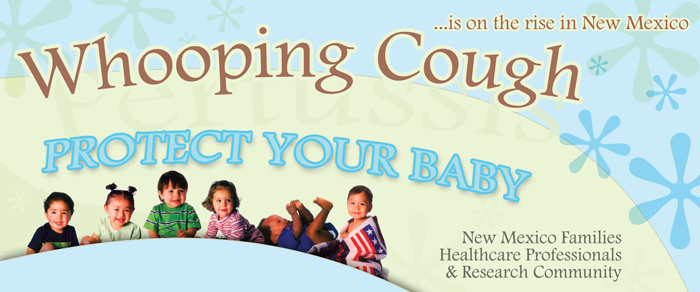
NMDOH News:
- Department of Health Encourages Vaccinations
SANTA FE – The New Mexico Department of Health reported today that 331 cases of pertussis (whooping cough) have been reported in New Mexico in 2013.
“Pertussis is very contagious and can cause serious illness―especially in infants too young to be fully vaccinated,” said Department of Health Secretary Retta Ward, MPH. “Getting vaccinated is the best way to prevent pertussis. The Department of Health recommends that pregnant women and anyone who is going to be around a baby make sure they are up to date on their pertussis vaccination.”
The counties with the highest rate of pertussis this year are Los Alamos, Taos and Santa Fe. Rates are used to describe disease activity of cases over a given period of time. Rates take into account the different population sizes of demographic groups or geographic areas so that meaningful comparisons can be made between groups and areas.
In 2012, 898 cases of pertussis were reported in New Mexico. Two children died last year. No deaths have been reported this year, but nine infants have been hospitalized.
New Mexicans can contact their health care provider or pharmacy to get vaccinated. Public health offices offer the vaccine to those without insurance. There are two types of pertussis vaccine: DTaP and Tdap. DTaP is the vaccine for infants and children, and Tdap is the pertussis vaccine for older children, adolescents and adults.
Pregnant women should receive a Tdap vaccine with each pregnancy, ideally between the 27 and 36 week of pregnancy. Vaccinating during pregnancy allows for protective antibodies to be passed from the mother to the fetus so that the newborn is protected in the first 2 months of life before receiving first pertussis vaccinations at 2 months of age. This strategy was first recommended by CDC in February of 2013.
Anyone who is going to be around an infant should make sure they have been vaccinated with Tdap before coming in contact with an infant. The principle behind this strategy is that by assuring that everyone around an infant has been vaccinated, the risk of transmission to the vulnerable infant can be reduced. This strategy, known as “cocooning,” was first recommended by CDC in 2006.
The New Mexico Department of Health recommends the following to help reduce the spread of pertussis:
- All pregnant women should receive a Tdap booster ideally between the 27 and 36 week of each pregnancy
- All infants and children should receive the primary series of pertussis vaccine, called DTaP, at 2, 4, 6 and 12-18 months of age
- All children should receive a booster dose, called DTaP, prior to school entry at 4 to 6 years of age
- Children between 7 and 10 years of age who are behind on pertussis vaccine should get a Tdap
- Children should receive a booster dose of Tdap at entry to middle school if they haven’t received one previously
- All teens or adults should receive a Tdap booster if one was not given at entry to middle school
- Anyone caring for or spending time with an infant should receive a Tdap booster if they have not received one in the past, including people 65 and older
- All healthcare personnel should receive a Tdap booster, as soon as feasible, if they have not received or are unsure if they have previously received a dose of Tdap
New Mexicans can contact their health care provider or pharmacy to get vaccinated. Public health offices offer the vaccine to those without insurance. Find more information about pertussis at http://nmhealth.org/Pertussis/.

